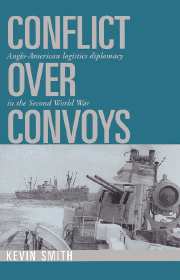Book contents
- Frontmatter
- Contents
- List of maps
- List of tables
- Preface
- List of abbreviations and codewords
- Introduction
- 1 “Not what it could or should be”: Britain's shipping situation
- 2 “Beyond our power without your help”: Britain's Battle of the Atlantic
- 3 “But westward, look, the land is bright”: American shipping assistance from neutrality to belligerency, March 1941–November 1942
- 4 Roosevelt's promise: “your requirements will be met”
- 5 The Casablanca Conference and its aftermath: a “most curious misunderstanding”
- 6 Reaping the whirlwind: the perils of impending victory
- Postscript and conclusions
- Appendices
- Tables
- Notes
- Bibliography
- Index
2 - “Beyond our power without your help”: Britain's Battle of the Atlantic
Published online by Cambridge University Press: 06 July 2010
- Frontmatter
- Contents
- List of maps
- List of tables
- Preface
- List of abbreviations and codewords
- Introduction
- 1 “Not what it could or should be”: Britain's shipping situation
- 2 “Beyond our power without your help”: Britain's Battle of the Atlantic
- 3 “But westward, look, the land is bright”: American shipping assistance from neutrality to belligerency, March 1941–November 1942
- 4 Roosevelt's promise: “your requirements will be met”
- 5 The Casablanca Conference and its aftermath: a “most curious misunderstanding”
- 6 Reaping the whirlwind: the perils of impending victory
- Postscript and conclusions
- Appendices
- Tables
- Notes
- Bibliography
- Index
Summary
The continuation of the current rate of loss incessantly adds to the even graver shipping problem with which we shall inevitably be faced in 1941 and later.
Ronald Cross, Minister of Shipping, December 1940… [public] thoughts at present were more directed toward the dangers of invasion than to the dangers of starvation.
Winston Churchill, July 1940… limitations of shipping must not be allowed to interfere with the urgent military necessity of concentrating such forces as we required in the Middle East.
Winston Churchill, November 1940Far from offsetting the failure of British shipbuilding, neglect of port and shipping management initially eroded Britain's logistical independence after France's defeat. Prime Minister Winston Churchill bears culpability for his Government's belated recognition that the long-term threat of a shipping shortage demanded immediate attention. Minister of Shipping Ronald Cross did foresee an escalating shipping crisis. But Churchill overlooked the decline in shipping capacity and delayed priority for seaborne communications. He was preoccupied with the Nazi invasion threat after Germany's conquest of France, and correctly surmised that the British people shared that fear. The Royal Navy concentrated on deterring invasion, largely ignoring escort duties until late autumn. Steel was diverted from merchant shipbuilding to naval and tank production. Obsession with invasion thus threatened to postpone retribution for aggression indefinitely and perhaps bring starvation. Insofar as Churchill focused elsewhere in the autumn of 1940, he prematurely sought success in the Middle East.
- Type
- Chapter
- Information
- Conflict over ConvoysAnglo-American Logistics Diplomacy in the Second World War, pp. 28 - 63Publisher: Cambridge University PressPrint publication year: 1996



